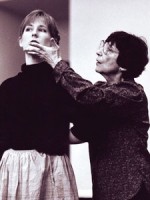Column Name
Title
This past summer I had the pleasure of reading a new book on the Alexander Technique, just published in June by Mornum Time Press: Dare to Be Wrong: The Teaching of Judith Leibowitz.
Body
Dare to be wrong? But we’re all trying so hard to get it right!
Exactly.
As I read, my wonderful memories of studying with Judy, training with her, and assisting her in classes came flooding back.
Judith Leibowitz is a teaching legend. Her memory evokes love, awe, and gratitude both in the Alexander community and in our own Drama Division, particularly among the fortunate alumni who worked with her. By 1968, when she joined the acting faculty of the new division at the invitation of John Houseman, she had trained the majority of Alexander teachers in the United States. From 1968 until her death in 1990, she taught the Alexander Technique to an entire generation of Juilliard actors.
As a teacher, she was amazing. Some students called her “Yoda.” There were hushed whispers that she could actually levitate; that when no one was around, she would fly; that she could read your mind. All of these fantastic, playful stories were a tribute to the power and magic of her teaching. Under her hands you did the unexpected, surprised yourself, and opened new possibilities.
Her influence and teaching tradition still extend throughout The Juilliard School, for most of the Alexander teachers here were trained by Judy at the American Center for the Alexander Technique, which she co-founded in 1964. Jaye Dougherty (working in drama and music), Jane Kosminsky (dance and music), Lori Schiff (music and vocal arts), and I (drama) all trained at the center. We revered Judy. She was filled with joy in the work and she knew how to inspire the best in her students.
Reading Dare to Be Wrong was like hearing Judy’s voice again. Indeed, it is her voice, for the book, beautifully and sensitively edited by Kathryn Miranda, is a collection of transcripts of classes Judy taught, her notes and articles, and interviews she gave over a rich and varied lifetime of teaching. Memories and writings of those who knew and worked with her are sparingly quoted to give context or illumination. The material is organized into chapters with inviting titles such as “Voyage of Discovery,” “Begin by Leaving Yourself Alone,” and “The Less You Know The More You Can Experience.” The text combines, as Judy herself did in her teaching, practical steps for working on particular issues—walking, for example, or vocalizing—with observations about how we think, learn, and respond. The book is an interweaving, like all good teaching, of the practical, philosophical, and inspirational. The text captures the lively spontaneity and moment-to-moment quality of Judy’s teaching. Her humor and compassionate acceptance of whatever was happening in the moment shine out.
Whether you are on the teaching side or the learning side of the educational experience, this new book will speak to you. Although it was created as an enduring record of Judy’s teaching style and philosophy for Alexander teachers and teachers-in-training, it has relevance for all of us. At deep levels of being, the struggle between needing to get it right and fear of being wrong persists. How can we move into the unknown, go on a “voyage of discovery” about ourselves and our work if we are stuck in habitual behavior and fear of making a mistake? The book begins with a quotation:
Dare to let it feel wrong. Take a chance on letting me give you an experience that you don’t think is right. When you walk out of this room you can always go back to what feels right. But right now, you’re allowing both of us the luxury to make a mistake.
Daring to be wrong quite naturally leads to developing faith in one’s process, and this is the second major message of the book: that trust in the process leads to freedom and choice, and ultimately to a desired result. With characteristic simplicity, Judy says, “We are dealing not with the goal but the in-betweens that help us reach our goal.” The last seven chapters of the book focus on teaching issues. Her discourse reveals her adherence to process, her humility in letting herself not know, the compassionate acceptance of where the student is in the moment. No matter what our disciplines, as teachers most of us search for ways of achieving our goals without end-gaining. We seek to be process oriented, to remove fear and anxiety from the learning experience, to allow learning by empowering the student. In these pages, we can find encouragement and insights to support us in our work:
I help the student become interested in making the choice. If people know their hearts, they recognize their habits. There is a way of stopping the habit and changing it. They seek to change it and it comes down to each student making a choice.
This new addition to the Alexander Technique literature reveals the thinking of a great master teacher. Wherever you are on the learning spiral—student, teacher, or seasoned performer—Judy’s voice will renew your faith in your process, dare you, and inspire you as you make the journey from the habitual to the conscious choice.





